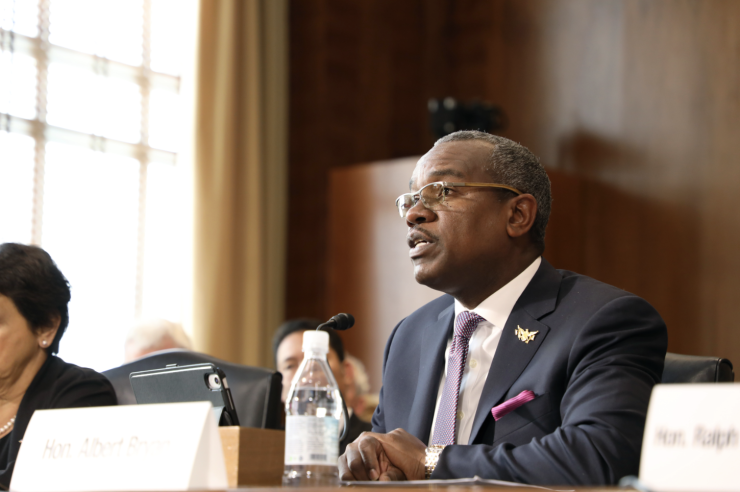The U.S. Virgin Islands government approved a fiscal year 2020-2021 budget that was on time but failed to address a roughly $4.4 billion underfunding problem for its pension system.
Governor Albert Bryan Jr. signed the Senate approved budget on Tuesday. It was largely like the budget he proposed to the Senate in late May. The Virgin Islands fiscal year started on Oct. 1.

“The timely adoption of the budget, along with recent release of the fiscal 2017 audit, demonstrates the government’s progress in re-establishing basic financial management since the hurricanes," Moody’s Investors Service Analyst Kenneth Kurtz said in a statement to The Bond Buyer. "Revenue estimates in the budget confirm the improvement in the territory’s near term financial condition and liquidity. But the government continues to face significant long-term challenges, including a poorly funded pension system and a heavy debt load.”
Referring to the Government Employees Retirement System, then Office of Management and Budget Director Designee Jenifer O’Neal said in the May budget submission, “GERS continues to hemorrhage and is in need of reform legislation. We continue to seek answers to what is actually owed to the system by [the Government of the Virgin Islands] for unfunded employer obligations.”
As of March 2018 the system projected that it would run out of money in late 2020 or early 2021. On Sept. 19 Moody’s said it expected the assets to be depleted in 2023 or sooner. The system reported in August 2016 the system had a funded ratio of 27.7%.
On Sept. 19 Moody’s affirmed its Caa3 issuer rating on the islands’ government. It also affirmed its Caa2 rating on the islands’ senior lien matching fund bonds and Caa3 rating on its subordinate lien matching fund bonds. The islands government had $1.06 billion of this debt outstanding, according to Moody’s.
“The Caa3 issuer rating reflects a small and highly concentrated economy, government finances that have been severely strained, a very poorly funded pension system that is rapidly depleting its asset base, financial reporting and other governance challenges, and the government’s loss of capital markets access since 2017,” Kurtz said on Sept. 19.
As of Sept. 30, 2017, the islands' government had $2.01 billion in bond debt outstanding including $1.2 billion of matching fund bonds, $722 million in gross receipts tax bonds, and $85 million in federal aid highways bonds. These figures are from its audited statement.
The governor office’s press statement on the budget signing said Bryan “raised concern with a line item in the [Senate-approved] budget, which calls for an appropriation of $10 million to only fund retroactive payments to retirees over 65.”
The governor said, “While I agree with the intent and want to pay what is owed for retroactive wages, this appropriation to fund what’s owed to those 65 and over is discriminatory to retirees who are under 65, and only a fraction of the more than $100 million we believe is owed to just those retirees. The government of the Virgin Islands owes retroactive wages to active and retired government employees, but our priority at this point with extra surplus funds is to continue paying the outstanding backlog of income tax refunds that are owed.”
The approved budget is for roughly $1.2 billion in spending, which includes about $70 million for debt service, about $216 million of federal funds, and about $942 million of local funds.





